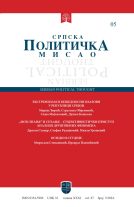- Home page
- Researchers
- Danijela M. Lakić
Danijela M. Lakić
Pravni fakultet, Slobomir P Univerzitet, Republika Srpska

THE DRAWBACK OF LIBERAL NATIONALISM AS A CONDITION FOR POSITIVE PEACE IN THE BALKANS
The subject of the paper is liberal nationalism as the only acceptable form of nationalism for the Balkans, which has been imposed and allowed by the so-called great forces (the EU and the USA) after the end of the Cold War for this, from a political and ethnic aspect, unstable region. Liberal nationalism is an integral part of liberal peacebuilding, a dominant matrix on a global level, and it has been established as one of its strategies for building and maintaining positive peace, the conditions of normal functioning and the path of the Balkan countries towards the European Union. The paper first explains the concept of positive peace and provides an overview of the state in our region, and then it points to the central ideas of liberalism and nationalism as the foundations of liberal nationalism, whose features are stated thereafter. The focus of the paper is on the analysis of the shortcomings of liberal nationalism since political and ethnic crises in the Balkan countries in the last decade indicate that, in the imposed basis of peace in these societies, “something is not right”. As the most obvious drawback of the application of liberal nationalism in the Balkans, favoring political nation model has been identified, which is contrary to the history and specificities of Balkan peoples (it resulted in the projects such as the building of the so-called Bosnian and Montenegrin nation, which has deepened ethnic-identity conflicts as the basis of political crises endangering the functioning of these states).
In the concluding remarks, as a basic way to solve this drawback, or rather the illogicality, of liberal nationalism as a condition for positive peace in our region, focusing and returning to the cultural model of the nation is proposed because, firstly, this is the authentic feature of this type of nationalism, which is in accordance with its origin and characteristics, and secondly, the cultural-ethnic determination of the nation is the prevailing and authentic model of the nation in the Balkans. This idea about emphasizing the primary status of a cultural version of a nation refers to the aspect of liberal nationalism on the necessity of including national belonging, as an integral part of cultural belonging, in primary goods that the state ensures for its citizens, which means that liberal state cannot be fully ethnically neutral either. Furthermore, the cultural nation model, as an autochthonous feature of Balkan peoples, needs to be included more intensively in all the segments of liberal peacebuilding, whereby its adverse effects would be mitigated in the Balkans at least in part.

THE FACTORS OF THE RISE OF ITALIAN RADICAL RIGHT WITH THE REFLECTION ON ITS FASCIST ELEMENTS
The topic of the paper is the Italian radical right, which won a landslide victory in last year’s elections and formed the most right-wing government since World War Two. The aim of the paper is to determine the reasons for strengthening the Italian right’s fascist wing through the analysis of its history and the circumstances of its activity and to show whether the fears of the European Union that fascism returned to one of its founding countries are justified. The main difference between the modern radical right and fascism is its acceptance of democracy and political pluralism. It is fundamentally different from classic fascist parties, it is characterized by populism and not elitism, nativism instead of racism, it is not autocratic but democratic. Up until the nineties, the term right was equated with fascism in Italian political discourse, so a true right did not even exist as a regular actor in political life. The conclusion of the paper is that Italy never truly broke with fascism, the process of defascification was not carried out in its entirety. The victory of the radical right, in which the youngest party, Fratelli d’Italia, which is the offspring of Mussolini’s party, dominates is the result of the EU membership itself and the waves of crises it faces, the specificities of the Italian political system, the peculiarities of Italian fascism, a general weakening of liberal order with the transformation of the left and the right. The right did not win a two-thirds majority in the Parliament which is a prerequisite for the government of the right to alter the constitution without a referendum, and so the legal realization of radical policies is under control. There is minimal risk of the deterioration of relations with the European Union because, regardless of the current more moderate approach, Giorgia Meloni advocated the abandoning of the Eurozone and conceptually different structure of The Brussels regime.
